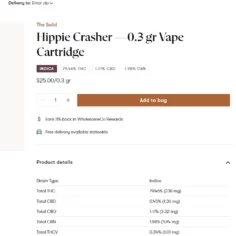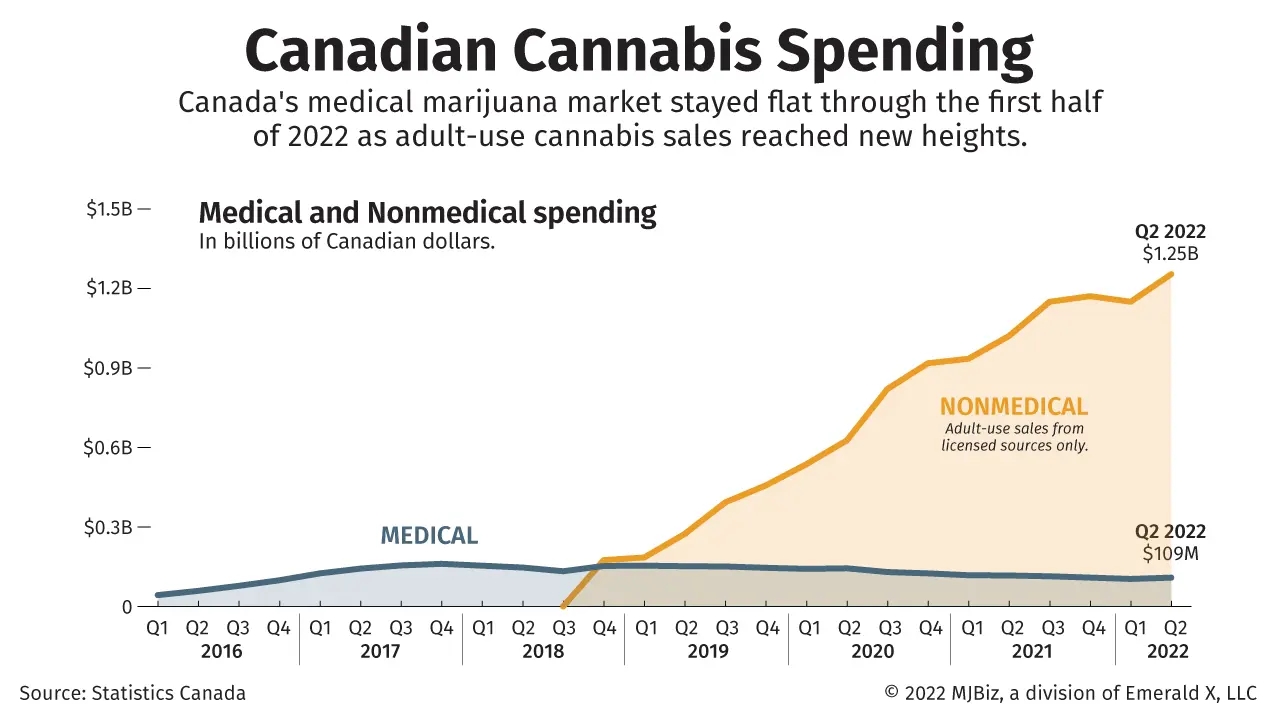Utah regulators say they’re pushing for new rules governing the presence of delta-8 THC and other synthetic cannabinoids allowed in the state’s medical marijuana supply.
The regulators are reacting after patient advocates, product makers and researchers sounded the alarm over safety concerns in an MMJ market that Utah voters legalized in 2018.
The first medical cannabis pharmacies – as MMJ dispensaries are called in Utah – opened in 2020 after the state Legislature and then-Republican Gov. Gary Hebert made later tweaks.
Those tweaks make Utah an outlier among its more liberal neighbors such as Colorado and Nevada, according to patient advocates and researchers.
Unlike those two states, Utah law currently allows “THC analogs” into edibles, vaporizer cartridges and other products sold in state-licensed pharmacies.
Analogs are defined as “a substance that is structurally or pharmacologically similar to, or is represented as being similar to, delta-9-THC.”
State officials admit this has made it legal for MMJ pharmacies to sell products that contain delta-8 THC as well as other controversial synthetic derivatives with unknown safety profiles, including delta-6 and delta-10 THC.
Underscoring concerns from researchers and advocates, Utah patients have reported adverse effects such as blackouts after using products containing delta-8 THC, which other states have banned.
Largely unknown to the public before passage of the 2018 Farm Bill – which triggered a flood of hemp and hemp-derived products nationwide – delta-8 THC can be created from CBD isolate via a chemical process.
That process is almost entirely unregulated.
Experts have said that the chemical process might also taint the end product with contaminants that are unknown to science and not detected during laboratory analysis.
Authorities also blamed delta-8 THC for the May death of a Virginia toddler, whose mother was charged with homicide.
Although, to date, “no public health body has recognized a synthetic cannabinoid as a toxic or deleterious substance,” the Utah Department of Agriculture and Food (UDAF) is asking for changes to state law “that would allow us to restrict the presence of synthetic cannabinoids in products in Utah, even if they have not been demonstrated to be toxic,” said Brandon Forsyth, the director of the agency’s Cannabis and Hemp Division.
“This is being done out of an abundance of caution,” Forsyth told MJBizDaily via email.
Whether the changes would impose limits or an outright ban is “still being discussed,” he added.
“As I’m sure you can appreciate, there are a lot of details to consider.”
‘Hot-button deal’
The UDAF’s pivot to consider new rules follows a monthslong public-safety campaign led by marijuana manufacturers and patients, some of whom say that products containing delta-8 THC purchased at state-licensed MMJ pharmacies caused troubling complications.
Other critics have said that Utah’s allowances for delta-8 THC and other analogs allows so-called “hot hemp” into the state medical cannabis program, charges regulators have denied.
“This is a super-hot-button deal,” said Blake Smith, a trained biochemist and chief scientific officer at Zion Medicinal, a licensed manufacturer in Salt Lake City that makes oils and other products sold at MMJ pharmacies across the state.
Smith expressed familiar concerns over these understudied analogs’ unknown safety profiles.
He and other advocates have called for state authorities to more strictly regulate Utah MMJ products – and, if necessary, ban analogs outright.
“Here’s the deal: Lack of data does not equal safety,” he said. “If we don’t know anything about these things that we just discovered, we should probably not be giving them to cancer patients.
“I think that’s perfectly reasonable, and yet, nobody seems to be moving in that direction.”
Alex Iorg is the co-founder of Salt Lake City-based WholesomeCo Cannabis, which sells products such as vaporizer cartridges that contain delta-6 and delta-10 THC, according to the company’s website.

That disclosure is a recent development, an update made “to improve transparency of the presence of these cannabinoids,” Iorg said.
“In the end, we rely on and comply with the state’s guidance on testing requirements and patient safety,” he said, noting that “a lot is unknown about these cannabinoids.”
He also questioned whether other states might also have synthetic cannabinoids in their regulated medical cannabis products supplies.
“State regulators suggested this may not just be a Utah issue but, rather, a national cannabis issue,” he said.
“We are curious to find this out as well, as Utah’s cannabis production standards and practices did not originate in Utah.”
In a Nov. 3 news release, the UDAF acknowledged “recent increases in the availability of products that contain poorly characterized cannabinoids,” including “cannabinoids that are produced semi-synthetically/synthetically,” such as delta-8.
The department pulled some products from shelves over safety concerns, but those holds were lifted by the state Department of Health and Human Services (DHHS) – which directly oversees the Utah medical cannabis program – after the agency was “unable to find any evidence that these cannabinoids are harmful to human health at this time,” according to the UDAF.
OK, as long as it’s labeled
That release followed an Oct. 25 hearing in which Rich Oborn, director of the DHHS’ Center for Medical Cannabis, confirmed that Utah allows “synthetic and derivative cannabinoids,” provided they “are listed on cannabis product labels.”
Patients concerned about the safety of such products “should talk with their medical provider and/or a medical cannabis pharmacist to determine if they should use products with synthetic and derivative cannabinoids,” he added, according to meeting minutes and a recording.
The DHHS did not immediately respond to an MJBizDaily request for comment.
State lawmakers are expected to revisit medical marijuana regulations during the legislative session that begins in February.
That isn’t nearly enough for Zion Medicinal’s Smith and for outside observers such as Dr. Ethan Russo, a neurologist and acknowledged national expert.
In a letter he submitted to state authorities and shared with MJBizDaily, Russo pointed out that “it is possible to make a blanket assertion that all products with delta-8-THC content of significant concentrations are contaminated with delta-6-, delta-10-THC, possibly other isomers, and residual solvents, making them public health risks.”
Since “no formal studies” into these analogs’ toxicology and effects in humans have been conducted, these products should be pulled from shelves and not sold until they are studied, he said.
Blackouts, lack of trust
During that Oct. 25 meeting, several patients told state regulators that they suffered blackouts and other serious aftereffects after using state-licensed products that contained delta-8 THC and that the synthetics pose serious concerns.
Before making a recent purchase, “I had an hourlong conversation with a pharmacist, expressing I needed good, clean medicine,” medical marijuana patient Mitchell Butterfield said.
That pharmacist led him to purchase a vaporizer cartridge that indicated it contained delta-8 THC, he said.
“I asked him what was in it, and he said, ‘It’s still just THC. The state just makes it label it that way,’” Butterfield said.
He bought it and brought it home. He hit it and, “after five minutes, I started yawning uncontrollably and then I blacked out,” he said.
“In 50 years’ experience with this plant, I have never had an experience like that,” said Butterfield, who added that the MMJ pharmacy refused to give him a refund and instead offered him only half off a future purchase.
“I don’t trust the CBD products on the market because of all the synthetics. … The delta-9 and -6 and all of that garbage,” Emily Tucker, a patient who said she has a teenaged son who wants to treat anxiety with CBD but is fearful about product quality, said during the meeting with regulators.
“I want to keep him safe. I don’t want him to get high because people are trying to make a cheap high.”
Christine Stenquist, the founder and president of nonprofit advocacy group Together for Responsible Use and Cannabis Education (TRUCE), said the only acceptable level of THC analogs “is zero.”
“If you can’t create quality products, you should not have a license in this state,” she told MJBizDaily.
While she welcomes limits on synthetics, she faulted state regulators for trying to “minimize safety concerns from the beginning” and says she’s heard rumors that synthetic analogs will still be allowed under new legislation, though with age limits.
“We never wanted synthetics in the program,” she said. “They’re only acting out of abundance of caution because I am raising Cain everywhere.”
Chris Roberts can be reached at chris.roberts@mjbizdaily.com.





